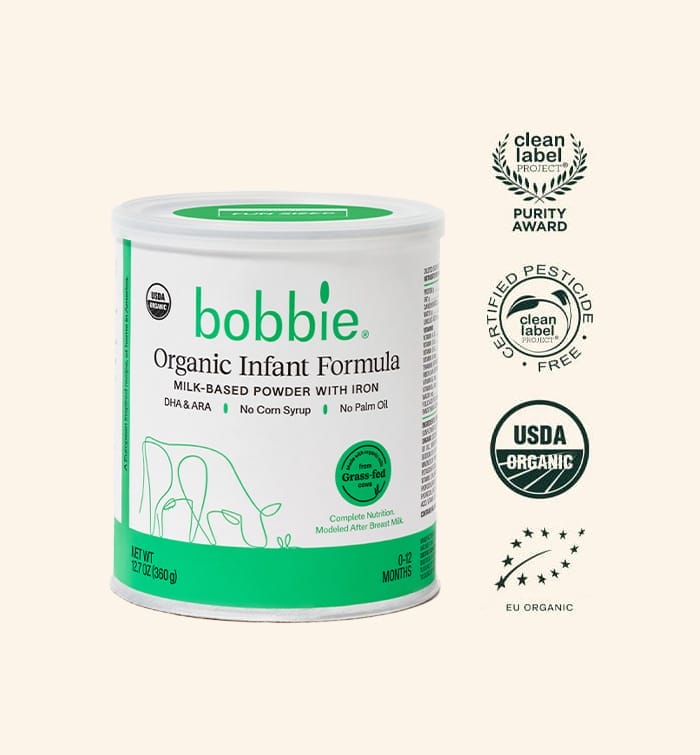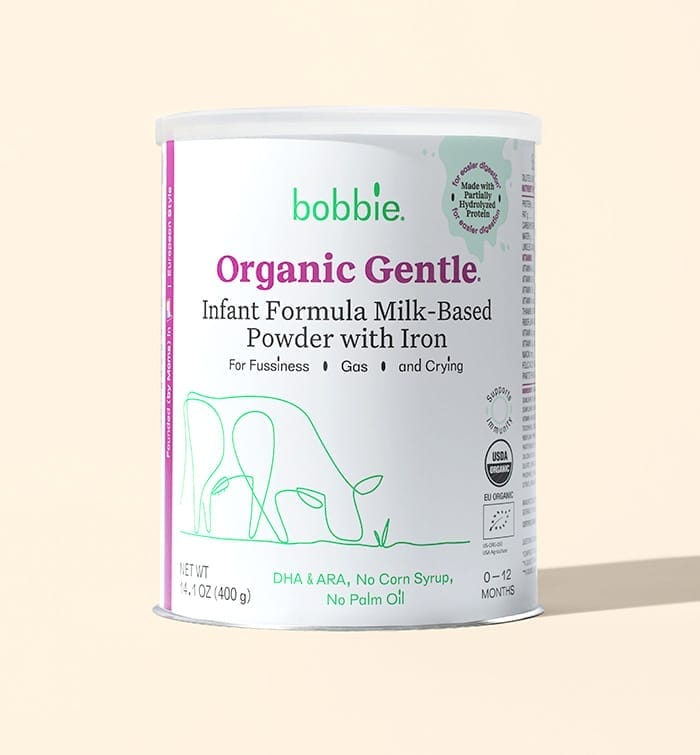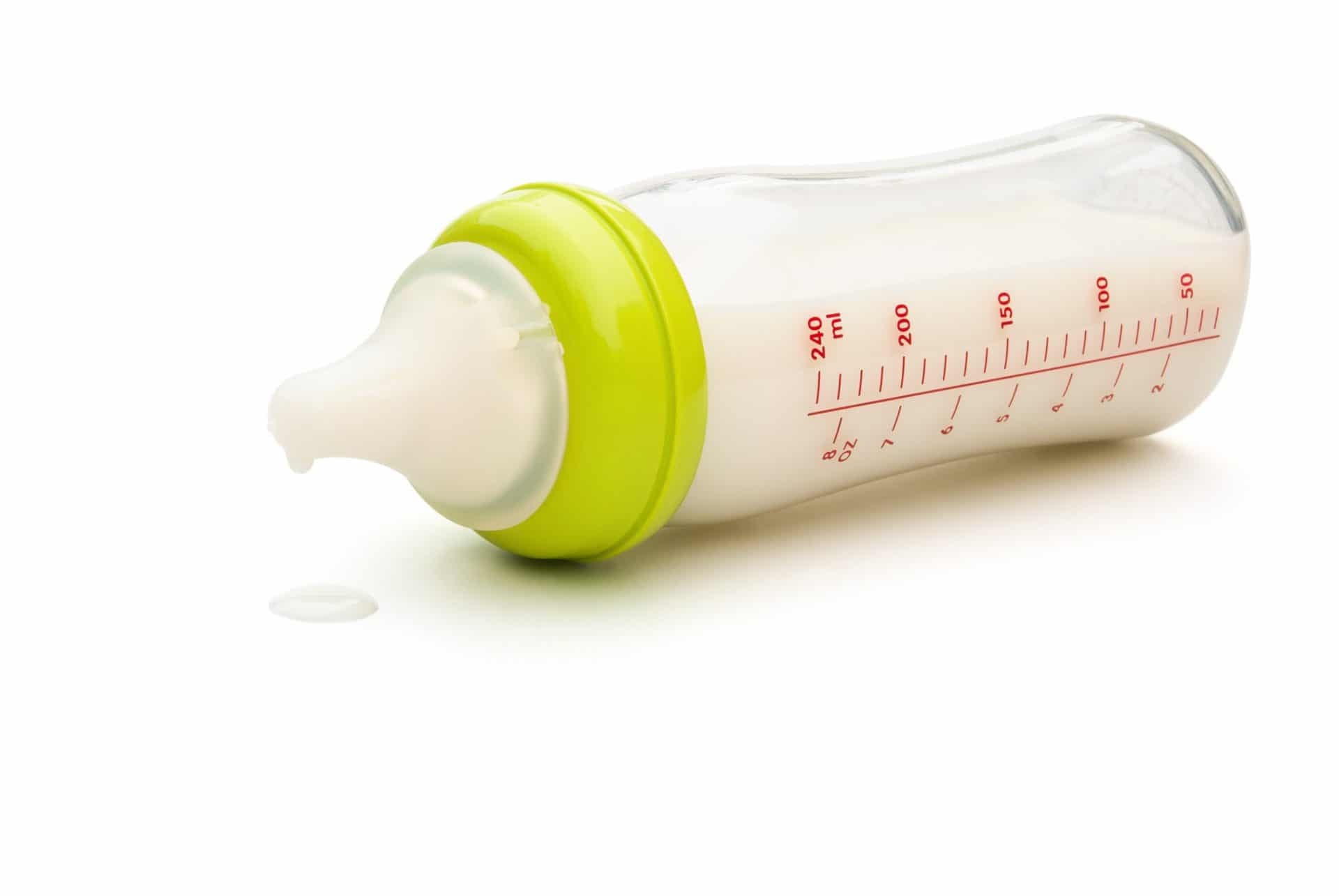We are proud to say that these posts are not sponsored. Our editorial team of Bobbie moms and writers personally select each featured product. If you buy something through our links, we may earn an affiliate commission, at no cost to you.
If you’re new to formula feeding or just learning your options as a parent-to-be, you might have questions like, “What’s actually in baby formula?,” “What makes baby formula nutritious?,” or “How does the nutrition in baby formula compare to breast milk?” Whether you are breastfeeding and using formula as an occasional supplement, or using baby formula exclusively, we want to make sure you understand what your baby formula is made of.
Let’s dive in and discuss ingredients, nutrients, and types of baby formula so you can feel confident about what and how you’re feeding your baby.
So… What is Baby Formula?
At its core, baby formula is an intentionally-crafted product that provides the essential macronutrients and micronutrients that an infant needs for healthy development from birth through 12 months. Formula is manufactured to be nutritionally-complete, mirroring the nutritional composition of breast milk as closely as possible.

Shop Bobbie Organic Infant Formula
Bobbie Organic Infant Formula is a USDA Organic, EU-style infant formula that meets all FDA requirements. It is a complete nutrition milk-based powder modeled after breast milk and is easy on tummies. It is non-GMO and doesn't have corn syrup, palm oil, or maltodextrin. Learn more about Bobbie.
Baby Formula is Safe
Infants are vulnerable by nature. As such, ensuring that their food source is safe is a top priority! Baby formula that is sold in the US meets FDA requirements and goes through a rigorous process to ensure it’s safe, free of contaminants, free of inclusions, and meets agreed-upon standards for processing, packaging, shipping, and storage. Check out Bobbie’s safety story to learn more about FDA baby formula regulations and product testing.
Baby Formula is Regulated
Baby formula is the most strictly regulated food product that you can buy. Formula in the U.S. is regulated by the Food and Drug Administration with additional guidance contributed by the USDA, the World Health Organization, and the CDC. If you’re wondering what baby formula is safe, please know that ALL infant formulas on the U.S. market are regulated by the FDA and are safe.
Homemade baby formulas and non-regulated formulas are never a safe option for your baby.
Baby Formula is Nutrient-Dense & Healthy
Formula is healthy. That’s right! Formula is packed with nutrients that help infants grow along a healthy developmental growth curve. Modeled after the nutrition in breast milk, baby formula contains protein, fat, carbohydrates, 29 vitamins and minerals, and essential fatty acids.
What is Baby Formula Made of?
- The ingredients list on a can of formula is similar to what you’d find on the back of any “superfood” shake! Here’s what you can expect to find in regulated infant formulas.
Ingredients in Baby Formula
Now that we know some key features of baby formula, let’s take a look at the ingredients in baby formula that make it nutritious. While the specific ingredients will vary from brand to brand, baby formulas all contain a primary source of carbohydrates (ideally lactose), healthy fats (some combination of vegetable oils, palm oil, coconut oil, safflower oil, sunflower oil etc.), protein (whey and/or casein in milk-based formulas), vitamins, minerals, and other nutrients (like probiotics and probiotics). Let’s break this down!
- Macronutrients in baby formula
- Protein – The proteins in milk-based infant formula are whey and casein. Soy formulas use (you guessed it!) soy protein, while hypoallergenic formulas use amino acids.
- Carbohydrates – Lactose is the main carbohydrate in most cow’s milk-based formula. However, there are often other kinds of carbohydrates used in cow’s milk-based infant formulas like sucrose, corn syrup, or maltodextrin. (Curious about why there is sugar in baby formula?- we’ve got you covered!)
- Healthy Fats – All infant formulas contain a blend of plant-based oils that provides a similar fatty acid profile to what’s found in mature breast milk.
- Micronutrients Minimum and some maximum requirements for the amounts of each vitamin and mineral in baby formula are set by the Food and Drug Administration (FDA).
Extras in Baby Formula
Some manufacturers add extra (aka not required) ingredients to their baby formulas. These additions are believed to offer additional benefits, such as supporting brain development, baby’s digestion, or their immune system.
Here is a list of extra ingredients you may notice when considering a formula for your baby:
- DHA *can be added separately
- ARA
- Prebiotics *can be added separately
- Probiotics *can be added separately
- Lactoferrin
- MFGM
Because the FDA sets minimum (and some maximum) amounts on the level of nutrients that must be in baby formula, it’s important to know that any commercial brand sold in the US meets these standards. So, while there is variation between brands of formula, and some may add additional ingredients, they all meet the standard nutritional needs of a healthy infant. This means that the generic or store-brand formulas are just as nutritious as their name brand counterparts.
Is there iron in baby formula?
Yes! Iron is an important ingredient in baby formula because it helps to prevent iron-deficiency anemia. All baby formulas have iron added, meaning they’re iron-fortified. Low-iron formulas are only needed for certain medical conditions and shouldn’t be used unless recommended by your baby’s healthcare provider.
Breast milk vs Formula Nutrition Chart
Let’s take a look at how breast milk compares to formula! Infant formulas are modeled after breast milk and as a result, they contain many of the same components. You may be surprised to see that the comparison chart of breast milk vs formula is very similar! You can rest assured that your baby is getting all the nutrition they need from their formula if breast milk isn’t an option.
Many families wonder if there are benefits of breast milk vs. formula. There are some components of breast milk that formula cannot replicate, like antibodies, hormones, enzymes and stem cells. Even so, formula offers complete nutrition to promote healthy growth for infants through their first birthday.
Formula
- Water
- Macronutrients (protein, carbs, fat)
- Vitamins
- Minerals
- Essential fatty acids
- Prebiotics (*in certain formulas)
- Probiotics (*in certain formulas)
Breast Milk
- Water
- Macronutrients (protein, carb, fat)
- Vitamins
- Minerals
- Essential fatty acids
- Prebiotics (*in certain formulas)
- Probiotics (*in certain formulas)
- Hormones
- Antibodies
- Enzymes
- Stem cells
What are the Forms of Baby Formula?
Baby formula comes in 3 forms: powder, liquid concentrate, and ready-to-feed. Learn more about each form of baby formula below.
Powder Baby formula
Powdered formula comes in a container with its own measuring scoop. It’s typically easy to find and comes in many different varieties- milk-based, soy-based, hypoallergenic, organic, and the list goes on. This is generally the least expensive option and is prepared by mixing the powder in water. This is also the most environmentally-friendly option because it weighs less to transport. Powder formula also has the longest shelf life at 30 days from when it is opened. NOTE: Some pediatricians recommend that powder formula is not used for premature babies or infants who are immunocompromised as it’s not sterile. Please confer with your child’s doctor about what formula type is right for you!
Liquid Concentrate Baby Formula
Liquid concentrate formula comes in cans or tetra-paks, and is constituted to the correct ratio by mixing with water. One bonus of using liquid concentrate formula is that prepared, unused formula can be stored in the fridge for up to 48 hours. However, the trade off is that it is more expensive than powder.
Ready-to-feed baby formula
Ready-to-feed formula is, well, ready to feed. No mixing with water, just open and serve. Any unused formula from an opened container can also be stored in the fridge for 48 hours like formula made from liquid concentrate. However, you pay a price for this easy option, as it is the most expensive of the three. Ready-to-feed formula is sterile; as such, it’s commonly recommended for babies who are premature, immunocompromised, or have other health needs.
It is always best to speak with your pediatrician if you have any specific questions about your baby’s health needs when selecting a formula.
What are the Types of Baby Formula?
Baby formulas are often categorized by the type and size of protein used to make them:
Routine, Milk-based baby formula with intact protein
Most baby formula sold in the US is cow’s milk-based. It’s important to know that even though these formulas are “cow’s milk-based” they are modified to meet the needs of infants and reflect the nutritional composition of breast milk as much as possible. These are very different from the cow’s milk you get in a carton at the grocery store! These formulas contain both whey and casein proteins that are intact. Routine formulas are appropriate for most full-term infants!
Gentle, Milk-based baby formula with partially-hydrolyzed protein
After routine, “gentle” or “tolerance” formulas make up the largest segment of the formula market. These formulas also use cow milk protein, but rather than being intact, it’s partially-hydrolyzed (broken down) for easier digestion. These formulas typically include more whey protein than casein (or even exclusively whey protein!), and some are reduced-lactose.
Soy-based Baby Formula
This is just like it sounds— soy-based formula contains soy protein like the adult versions of soy milk you may be familiar with. However, just like milk-based formulas, these formulas are modified and have added ingredients to make them safe and nutritious for babies, so they are very different from the soy milk you may drink.
Hypoallergenic, Milk-based Baby Formula with Extensively Hydrolyzed Protein
These formulas may be protein hydrolysate (meaning the proteins are extensively broken down into much smaller pieces than in routine milk- or soy-based formula) or amino acid (without protein peptides) formulas. These formulas are used for babies with cow milk protein allergy (CMPA), milk/soy protein intolerance (MSPI), FPIES, or other medical conditions that impact formula tolerance.

Shop Bobbie Organic Gentle Infant Formula
Bobbie Organic Gentle is the only baby formula in the U.S. market that offers 100% partially-hydrolyzed whey protein and 100% lactose as the carbohydrate source. Our gentle baby formula is easy on sensitive tummies to help alleviate fussiness and gas. Learn more about Bobbie Gentle.
Overview of What’s in Baby Formula
Now that you know what is actually in baby formula, just remember that the list of ingredients in baby formula will vary depending on the brand. However, essential ingredients, vitamins, and minerals are in every baby formula, and all infant formulas on the U.S. market are safe, regulated, and nutritionally-complete.
Remember, the best baby formula is the one that works for you AND your baby! Your baby’s healthcare provider is an expert in all things baby formula, so you can always ask them any questions you have along the way!

Shop Bobbie Organic Infant Formula
Bobbie Organic Infant Formula is a USDA Organic, EU-style infant formula that meets all FDA requirements. It is a complete nutrition milk-based powder modeled after breast milk and is easy on tummies. It is non-GMO and doesn't have corn syrup, palm oil, or maltodextrin. Learn more about Bobbie.

